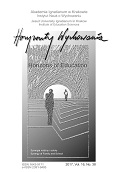Współpraca środowisk wychowawczych w procesie edukacji, opieki i rehabilitacji dzieci z niepełnosprawnością słuchu
Cooperation between Educational Environments in Education, Care and Rehabilitation of Persons with Hearing Disabilities
Author(s): Grażyna GuniaSubject(s): Education, Health and medicine and law, Family and social welfare, Inclusive Education / Inclusion
Published by: Uniwersytet Ignatianum w Krakowie
Keywords: rehabilitation of the deaf; special education; inclusion; partnership of parents;
Summary/Abstract: RESEARCH OBJECTIVE: The objective of the article is to present theoretical and applied assumptions regarding the risks, opportunities and challenges of cooperation between educational and rehabilitation services offered to people with disabilities and their families in the light of the existing legislative arrangements and organizational and socio‐cultural changes. THE RESEARCH PROBLEM AND METHODS: To achieve the objective of the study, the author undertook a query of literature and analysed her own empirical study. The research area was narrowed to the search of parents’ views on the contemporary needs of families with children with hearing loss and their assessment of the cooperation with specialists in the therapeutic and educational process. The study was based on a survey conducted among parents of deaf children, who are covered by comprehensive care in a specialist centre. THE PROCESS OF ARGUMENTATION: The article consists of two parts. The first one presents theoretical assumptions of special education exemplified in the activities aiming at synergy of different social groups. The second one, based on the review of the literature and conclusions of the study, discusses the examples of parents’ and professionals’ social expectations with regard to working together in order to support the development of people with disabilities. RESEARCH RESULTS: Cooperation between all persons engaged in supporting the child’s family and creating diverse communities of communication linking schools with families is focused on active participation of both the child and his family in this process. CONCLUSIONS, INNOVATIONS AND RECOMMENDATIONS: Searching for contemporary prospects of synergy of educational environments is associated with improving the quality of life in the dimension of equality, dignity, autonomy, identity, standardization, and inclusion. This is a problem widely discussed in theory, but in practice it is often underestimated or considered to be a new challenge for the activities in the educational sciences.
Journal: Horyzonty Wychowania
- Issue Year: 16/2017
- Issue No: 38
- Page Range: 55-71
- Page Count: 17
- Language: Polish

